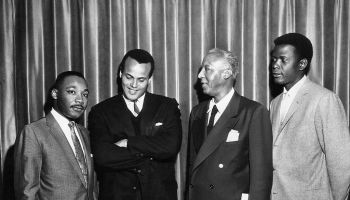First-time filmmaker Larysa Kondracki and “whistleblower” Kathy Bolkovac look very tired.
After back to back rounds of national press up and down the East Coast, they are here to talk to me and do it all over again. But as tired as they appear, the second they start talking about their movie Whistleblower, all signs of exhaustion fade away.
Their feature Whistleblower is based on Bolkova’s experience as a peacekeeper in post-war Bosnia. After losing custody of her kids because she reckons she worked those odd cop hours, while her ex had a 9-to-5 job and could be home for dinner at 6 p.m., she left her job in Lincoln, Nebraska to help rebuild a devastated, war-torn country and make real money to help her move closer to her kids. Or so she thought.
Instead, this idealistic and dedicated former cop found plenty of corruption, cover up and intrigue in her new world. This experience is now told in The Whistleblower with Academy-Award winning actress Rachel Weisz (who looks nothing like the blonde, tall and attractive Bolkova) and a stellar cast that includes Vanessa Redgrave and David Strathairn. Not bad for a first time director.
Kondracki is an intense woman on a mission and not one to mince words. While I would not want to pick a fight with her, I would definitely want her to tell my story if I was Bolkova, the brave whistleblower who tried to make a stink about some pretty damning information she learned regarding the corporation paying her bills AND the UN. Yes, as in the United Nations.
[pagebreak]
Kondracki describes being extremely motivated when she learned about Bolkova’s struggles in Europe where she filed and won a lawsuit (in Great Britain) against her former employer DynCorp for unfair dismissal due to a protected disclosure (whistleblowing).
She also felt so “mortified” by the realization of how broad and wide the human trafficking actually was, that she decided this was a story that needed to be told. Kondracki flew herself to Europe to meet Bolkova and to pitch her right to tell her story. Not a short order since Bolkova was already a celebrity in Europe (due to the lawsuit) and had already been approached by others interested in bringing her story to film.
While I was not in the room when these two first met in 2004, I am not surprised that the young and thirsty Canadian-Ukranian gal convinced Bolkova that she would do “a good job” in telling her singular story.
And Bolkova feels she made the right choice.
“I love this movie so much because Larysa was able to capture my story but also the bigger picture, which is what this is really all about, of corporate corruption, the U.N. corruption, the big spider web … but also see the global picture of how this ties with the rest of the world and how human trafficking follows the mission around the world. It’s big government. It’s big money.”
Those are fighting words about big folks doing big business in what seems like a dangerous world. It all sounds a bit intimidating, if you ask me.
[pagebreak]
But Bolkova is no shrinking violet and with her soft, yet authority-filled voice of a former cop, she shares that “it was a natural process for me. I wasn’t looking ahead. I was not thinking about what this was going to do to me personally.”
In hindsight she believes she stirred up a hornet’s nest on this issue while an employee of DynCorp because she was naïve.
Naïve or not, she was still a cop who went to Bosnia to do a job. And so she did her job, but what she learned stunned her. Even though as a former cop she dealt with pretty traumatic issues such as incest, child abuse and sexual assault, she was not ready for the complicity.
She admits with a trace of pain in her voice that the idea that fellow officers were involved in the sex trade of eastern European women, including minors, “psychologically killed me. That was the breaking point for me. It changed me in a way … it made me more careful … on who I trust … and I realized there is so much more to this than we will ever know.”
And while she has moved on in her life and has found love and a new career in the Netherlands, she will continue to be an advocate for the cause.
[pagebreak]
While from a law enforcement perspective she is convinced that the sexual trade problem is “impossible to eradicate, just like the drug wars,” she feels equally strongly that it can be fought much stronger than it is now with “investigations, thorough prosecutions and actual convictions.”
She explains that the problem as she sees it is that convictions can be as strong as a good investigation, but this cannot happen because the system does not have a mechanism in place to internationally investigate these cases. And what role does the U.N. play in all of this scandal?
Apparently, no role at all. In fact, Bolkova and Kondracki are both miffed that the U.N., instead of coming out and speaking out publically about the ongoing human trafficking problem or defending themselves against the allegations made my Bolkova in the movie, has chosen to remain quiet and supposedly issued an internal memo advising folks to ignore this movie. Apparently, the U.N. may be hoping that silence will make the issue go away.
After spending even a short time with these two ladies, I don’t see them being intimidated by anyone at the U.N., at Dyncorp, at the State Department or anywhere else. Kondracki believes very strongly that this issue needs to be part of the discussion going on in an open forum. “Look what Philadephia (the film) did for AIDS … this should be part of the public discourse” and neither woman is backing down.
In fact, Bolkova is actively supporting Senator Leahy’s legislation, the Civilian Extraterritorial Jurisdiction Act (CEJA) which if passed, would close a gap in current law to ensure that government employees and contractors working overseas are not immune from prosecution for criminal acts.
Both ladies support this bill and believe this would be a definite step in the right direction for victims around the world and a vindication of Bolkova’s work and faith in the justice system, which she still deeply believes in.
Now, this would be a very happy ending and would make a much needed epilogue to The Whistleblower.
Because as Kodracki states … the real life issue does not end with the movie, but is ongoing, and so maybe a few more whistles need to be blown.
















